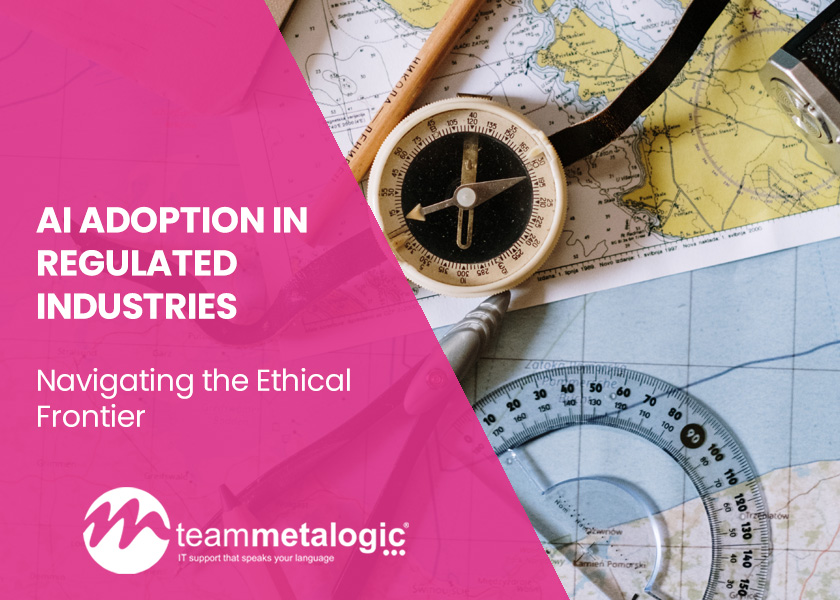In regulated industries across the United Kingdom, the integration of Artificial Intelligence (AI) has ushered in a new era of innovation and efficiency. Sectors such as finance, healthcare, and legal services are increasingly turning to AI to streamline operations and enhance decision-making. However, the adoption of AI in regulated environments also brings to the forefront complex ethical considerations. In this final article of our series, we explore the critical role of ethics in AI use within regulated industries, the ethical challenges faced, and strategies to ensure responsible AI adoption.
The Crucial Role of Ethics
Ethics plays a pivotal role in AI adoption in regulated industries. Unlike conventional technologies, AI has the ability to make autonomous decisions and learn from data. This autonomy raises important ethical questions and challenges:
- Fairness and Bias: AI systems can inadvertently perpetuate biases present in training data, leading to discriminatory outcomes. Ensuring fairness is a paramount ethical concern.
- Transparency: The “black-box” nature of some AI algorithms can make it challenging to explain the rationale behind AI-driven decisions, raising concerns about transparency and accountability.
- Privacy: Regulated industries often handle sensitive and confidential data. Ethical considerations demand robust data protection and privacy measures.
- Accountability: When AI makes decisions autonomously, it can be challenging to assign responsibility for errors or ethical violations, raising questions about accountability.
- Beneficence and Non-Maleficence: AI systems should aim to maximise benefits while minimising harm. Ethical considerations include the potential impact of AI on individuals and society.
Challenges in Ethical AI Adoption
- Lack of Ethical Expertise: There is a shortage of AI professionals with expertise in ethics. Regulated industries often lack the necessary ethical guidance to navigate complex AI decisions.
- Algorithmic Bias: Addressing algorithmic bias requires careful design, data selection, and ongoing monitoring. Ethical challenges arise when biases lead to unfair or discriminatory outcomes.
- Transparency and Explainability: Ethical AI should be transparent and explainable. Achieving transparency is challenging in complex AI models like deep neural networks.
- Data Privacy: Regulated industries handle vast amounts of sensitive data. Ensuring ethical data privacy practices and compliance with regulations like GDPR is a continuous challenge.
- Ethical Dilemmas: AI can present ethical dilemmas, such as autonomous vehicles having to make life-or-death decisions. Resolving these dilemmas requires clear ethical frameworks.
Strategies for Ethical AI Adoption
To address ethical challenges in AI adoption within regulated industries, organisations can implement the following strategies:
- Ethical Training and Education:
- Provide AI professionals and decision-makers with training in ethics.
- Promote awareness of ethical considerations in AI adoption.
- Diverse and Inclusive AI Teams:
- Foster diversity in AI development teams to reduce bias and bring different perspectives.
- Encourage interdisciplinary collaboration between technologists, ethicists, and legal experts.
- Ethical Frameworks:
- Develop and adhere to clear ethical frameworks that guide AI development, deployment, and decision-making.
- Ensure that these frameworks emphasise fairness, transparency, and accountability.
- Algorithmic Fairness:
- Implement techniques to identify and mitigate bias in AI algorithms.
- Regularly audit and assess AI systems for fairness and non-discrimination.
- Transparency and Explainability:
- Choose AI models that are inherently transparent or invest in technologies that provide explanations for AI decisions.
- Prioritise the use of interpretable AI models, particularly in critical applications.
- Data Privacy and Security:
- Strengthen data privacy and security measures, including encryption and access controls, to protect sensitive information.
- Conduct regular audits to ensure compliance with data protection regulations.
- Ethical Impact Assessments:
- Perform ethical impact assessments for AI projects to identify and address potential ethical challenges early in the development process.
- Engage Stakeholders:
- Involve stakeholders, including end-users and affected parties, in the ethical decision-making process.
- Solicit input and feedback to ensure that AI applications align with societal values.
- Regular Audits and Monitoring:
- Implement continuous monitoring and auditing of AI systems to detect and rectify ethical issues.
- Establish mechanisms for reporting and addressing ethical concerns.
What next?
In regulated industries, the adoption of AI brings significant benefits, but it also raises complex ethical questions. Ethical considerations are not just a moral obligation but also a legal and regulatory imperative. Regulated industries must navigate these challenges to ensure responsible and ethical AI adoption.
By investing in ethical training and education, fostering diverse and inclusive AI teams, and adhering to clear ethical frameworks, organisations can create an environment that promotes ethical AI use. Addressing algorithmic bias, ensuring transparency and explainability, and strengthening data privacy measures are essential steps in the journey towards responsible AI adoption.
As we embrace AI’s transformative potential in regulated industries, let ethics serve as our guiding compass. By prioritising ethical considerations, we can harness the power of AI while upholding the highest standards of fairness, transparency, and accountability, ensuring that AI benefits both individuals and society as a whole.
Links
“Ethics of Artificial Intelligence and Robotics” – [Source: European Commission] https://www.europarl.europa.eu/RegData/etudes/STUD/2020/654179/EPRS_STU(2020)654179_EN.pdf
“Building Trust in Artificial Intelligence” – [Source: Columbia University] https://jia.sipa.columbia.edu/building-trust-artificial-intelligence
“Artificial Intelligence and Machine Learning: Exploring drivers, barriers, and future developments in marketing management” – [Source: ScienceDirect] https://www.sciencedirect.com/science/article/pii/S0148296322003381
AI under great uncertainty: implications and decision strategies for public policy – https://link.springer.com/article/10.1007/s00146-021-01263-4
“AI Governance: A Research Agenda” – [Source: Oxford University] https://www.fhi.ox.ac.uk/wp-content/uploads/GovAI-Agenda.pdf
Artificial Intelligence Bias and Discrimination: Will We Pull the Arc of the Moral Universe Towards Justice? https://heinonline.org/HOL/LandingPage?handle=hein.journals/jintcl8&div=24&id=&page=
Exploring Bias Against Women in Artificial Intelligence https://www.duo.uio.no/bitstream/handle/10852/88551/All_Chapters_Master-s_thesis-Gender_Bias_in_AI-ver–9.pdf?sequence=1&isAllowed=y

